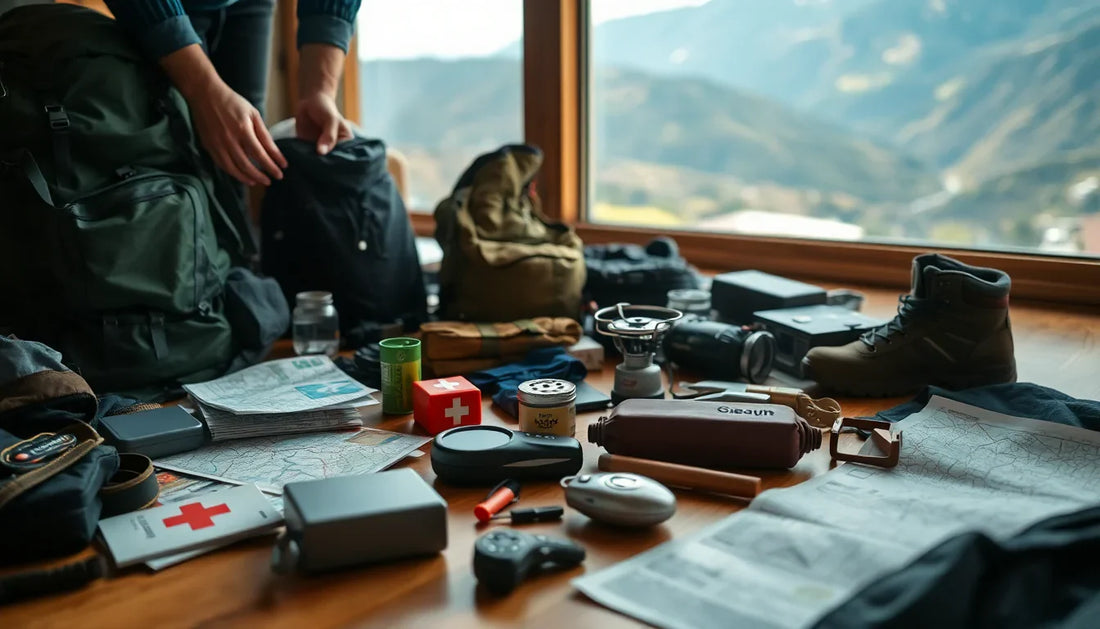
How to Plan a Multi-Day Camping Trip: Logistics and Packing Tips
Share
Embarking on a multi-day camping adventure can be an incredibly rewarding experience, allowing you to immerse yourself in nature, challenge your physical limits, and create lasting memories with friends or family. However, the success of such a trip often hinges on meticulous planning and preparation. In this blog post, we'll explore the key logistics and packing considerations to ensure your multi-day camping trip is a resounding success.
The Importance of Planning
Planning a multi-day camping trip is essential for several reasons. Firstly, it helps you anticipate and address potential challenges, such as inclement weather, equipment malfunctions, or unexpected changes in terrain. By thoroughly researching your destination, checking weather forecasts, and creating a detailed itinerary, you can minimize the risk of disruptions and ensure a smooth and enjoyable experience.
Secondly, proper planning allows you to pack efficiently and effectively, ensuring you have all the necessary gear and supplies without overburdening yourself. Packing the right items in the right quantities can make a significant difference in your overall comfort and enjoyment during the trip.
Finally, planning ahead can help you secure the necessary permits, reservations, and transportation, allowing you to focus on the adventure itself rather than last-minute logistics.
Pre-Trip Planning
Before embarking on your multi-day camping trip, there are several crucial steps to take in the planning process:
Destination Research and Route Selection
Carefully research your desired camping destination, taking into account factors such as terrain, elevation, and accessibility. Determine the best route to reach your campsite, considering factors like distance, difficulty, and scenic viewpoints. Consult maps, guidebooks, and online resources to gather as much information as possible.
Checking Weather and Terrain Conditions
Closely monitor weather forecasts for your destination, paying attention to potential changes in temperature, precipitation, and wind patterns. This will help you prepare appropriate clothing and gear, as well as plan for any necessary contingencies.
Obtaining Necessary Permits and Reservations
Depending on the location, you may need to obtain permits or make reservations for your campsite. Research the requirements well in advance and ensure you have all the necessary documentation.
Essential Gear Checklist
Packing the right gear is crucial for a successful multi-day camping trip. Here are the key categories to consider:
Shelter and Sleeping Equipment
Ensure you have a reliable and weatherproof tent, as well as a comfortable sleeping bag and sleeping pad. Consider the climate and expected temperatures when selecting these items.
Clothing and Layering Strategies
Pack a variety of clothing options that can be layered to accommodate changing weather conditions. Include base layers, insulating mid-layers, and weatherproof outer layers.
Navigation and Safety Tools
Bring a compass, map, and GPS device to ensure you can navigate effectively. Additionally, pack essential safety items such as a first-aid kit, emergency whistle, and fire-starting tools.
Cooking and Food Storage Equipment
Depending on your meal plan, you may need a portable stove, cookware, utensils, and food storage containers. Don't forget to pack water purification tablets or a filter.
Meal Planning and Food Preparation
Proper meal planning is crucial for a multi-day camping trip. Consider the following factors:
Calculating Nutritional Needs
Determine the caloric and nutritional requirements for your group, taking into account the physical demands of the trip and any dietary restrictions.
Lightweight and Non-Perishable Food Options
Choose foods that are lightweight, non-perishable, and easy to prepare, such as dehydrated meals, energy bars, and dried fruits and nuts.
Cooking Methods and Equipment
Decide on your cooking method (e.g., campfire, portable stove) and pack the necessary equipment, such as a camp stove, fuel, and cooking utensils.
Water Purification and Storage
Ensure you have a reliable way to purify water, such as a filter or purification tablets, and pack enough water storage containers to meet your needs.
Packing Strategies
Efficient packing can make a significant difference in the comfort and ease of your multi-day camping trip. Consider the following strategies:
Weight Distribution and Gear Organization
Distribute the weight of your gear evenly across your backpack or camping gear, ensuring a balanced load. Organize your items in a way that makes them easily accessible during the trip.
Compression Techniques
Utilize compression sacks, stuff sacks, and other packing methods to minimize the volume of your gear, making it easier to transport.
Multi-Purpose Gear Selection
Choose gear that can serve multiple functions, such as a headlamp that can also be used as a lantern or a multi-tool that includes a knife, pliers, and screwdrivers.
Logistical Considerations
Beyond packing the right gear, there are several logistical factors to consider for a successful multi-day camping trip:
Transportation and Vehicle Preparation
Ensure your vehicle is in good condition and can handle the terrain you'll be traversing. Pack any necessary tools or equipment for vehicle maintenance or emergencies.
Communication and Emergency Planning
Establish a communication plan with loved ones or emergency services, and pack a reliable means of communication, such as a satellite phone or emergency beacon.
Physical Fitness and Conditioning
Prepare your body for the physical demands of the trip by engaging in regular exercise and conditioning. This will help you maintain energy and endurance throughout the adventure.
Final Checklist and Pre-Departure Preparations
As the departure date approaches, take the time to thoroughly check and test your equipment, ensuring everything is in working order. Create a final checklist to ensure you haven't forgotten any essential items. Additionally, review your safety protocols and make any last-minute preparations to ensure a smooth and successful multi-day camping trip.
Conclusion
Planning a multi-day camping trip requires attention to detail, but the rewards are well worth the effort. By carefully considering the logistics, packing the right gear, and preparing for potential challenges, you can embark on an unforgettable adventure that will leave you with lasting memories and a deeper appreciation for the great outdoors. So, start planning your next multi-day camping trip today and get ready to immerse yourself in the beauty and serenity of nature.
